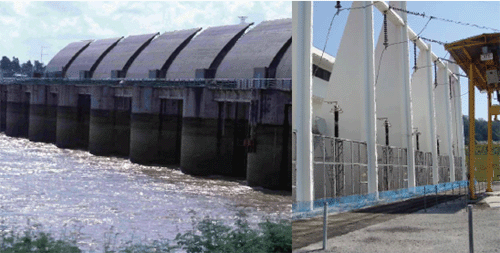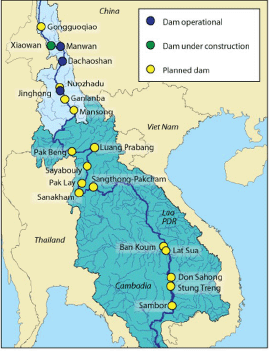Balancing hydropower and environmental costs - the Initiative on Sustainable Hydropower (ISH)

Interest in the Mekong river system as a source of hydropower has been on the rise over recent years. Member Countries see many benefits from the revenue that could flow from such projects; having the potential to stimulate their economies and contribute to the alleviation of poverty. Others see the cross-border trade in carbon-free electricity as an integral part of the future energy mix. Although the global economic crisis has reduced the rate of growth in electricity demand in many countries in the short-term, investment in and approval for hydropower projects has increased dramatically. So too have concerns about impacts on the environment, fisheries and livelihoods of people. The need to develop coordinated and integrated impact assessments, consistent and fair mitigation measures, and sustainable hydropower development strategies and policies is becoming increasingly apparent to the governments, stakeholders and community members of the Lower Mekong Basin.
The MRC is introducing a more holistic approach to the assessment of risks and opportunities of hydropower development in the Mekong region through a number of mechanisms. These include providing independent and impartial advice regarding the effects of hydropower projects - both existing and proposed, facilitating coordination amongst the riparian nations on hydropower research, assessment and strategy development, and encouraging dialogue and communication between government, the private sector stakeholders, civil society and local communities to improve hydropower decision-making processes.
The MRC's Initiative on Sustainable Hydropower formally began a number of fast-track activities in 2008. Work to determine the final structure of the proposed initiative continued throughout the year. A discussion brief outlining the scope of the programme was endorsed in principle by the Joint Committee in June as a cross-cutting initiative to be integrated with other MRC Programmes.
Components of the Initiative on Sustainable Hydropower are currently planned to include:
- Programme Management and Communication;
- Knowledge Base and Support;
- Regional Planning Support; and
- Hydropower Sustainability Improvement.

Programme Management and Communication
In order to lay foundations for programme implementation, a
series of meetings for groups involved in hydropower development
and policy making including line agencies, and other interested
parties were conducted throughout the latter half of 2008. As
part of a push to promote independent and impartial information
and advice being made available to stakeholders and the community
regarding hydropower impact, an Expert Group Meeting on "Dams
as Barriers to Fish Migration and Possible Mitigation Measures"
was organized in collaboration with the Fisheries Programme
and held in Vientiane, Lao PDR in September. The findings from
that meeting were presented to delegates at the Regional Multi-Stakeholder
Consultation on Hydropower; also in September 2008, in Vientiane.
The event was attended by around 200 participants representing
government agencies, project developers and financiers, MRC's
development partners and dialogue partners, as well as civil
society and other groups.
Presentations on the potential environmental and social challenges facing the Mekong as a result of hydropower proposals were made at the Stockholm International Water Week to a number of development partners, as well as at an international conference on the Yangtze and Three Gorges dams, the MRC also participated and made presentations to major civil society meetings in Bangkok and Phnom Penh.
Proposed and operational
hydropower dams on
the mainstream Mekong

Regional Planning Support
On the 8 December 2008 the MRCS and the Department of Electricity
(Ministry of Energy and Mines, Lao PDR) jointly organized a
"Briefing Meeting with Developers of Proposed Hydropower
Dam Projects on the Mekong in Lao PDR and Thailand," attended
by more than 60 participants, including representatives from
seven large private-sector hydropower developers, relevant Lao
Government planning agencies and their consultants. Particular
emphasis was given to the importance of an integrated basin-wide
perspective to ensure that any investment in hydropower projects
is wellcoordinated, sustainable, of benefit to the poor, and
does not cause significant adverse impacts on other uses of
the Mekong's water resources.
The presentations also included an explanation of the role of the MRC and National Mekong Committees and Procedures for Notification, Prior Consultation and Agreement (PNPCA) under the 1995 Mekong Agreement in order to give a better perception of the existing mechanism and protocol for coordination among MRC Member Countries. The developers provided status reports on their respective projects, highlighting key issues to address and aspects where MRC assistance may be appropriate. This was followed by an open session with questions and discussions for developers to receive clarifications from the MRCS on any outstanding issues. A similar meeting is planned in Cambodia for 2009.
Regional strategic environmental assessments, including assessments for proposed mainstream dams, were planned in 2008 and will begin in early 2009.
Hydropower Sustainability Improvement
The Environmental Considerations for Sustainable Hydropower
Development project was begun in 2008. This is a multi-stakeholder
process designed to establish sustainability assessment tools
for hydropower. The project has identified opportunities and
is cross-referencing these with the Environmental Programme.
The MRC facilitated a process to prepare design guidance for navigation locks in proposed hydropower dams. This will help ensure that if dams are constructed, they will not act as a barrier to trade and free passage - as stipulated in the 1995 Agreement.
Full implementation of the Initiative on Sustainable Hydropower is expected to start in 2009.
Choose a newsletter: